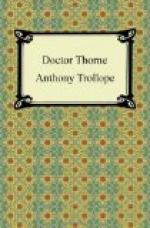The blow hit him terribly hard. It did not come altogether unexpectedly, and yet, when it did come, it was all but unendurable. He had made so much of the power of walking into that august chamber, and sitting shoulder to shoulder in legislative equality with the sons of dukes and the curled darlings of the nation. Money had given him nothing, nothing but the mere feeling of brute power: with his three hundred thousand pounds he had felt himself to be no more palpably near to the goal of his ambition than when he had chipped stones for three shillings and sixpence a day. But when he was led up and introduced at that table, when he shook the old premier’s hand on the floor of the House of Commons, when he heard the honourable member for Barchester alluded to in grave debate as the greatest living authority on railway matters, then, indeed, he felt that he had achieved something.
And now this cup was ravished from his lips, almost before it was tasted. When he was first told as a certainty that the decision of the committee was against him, he bore up against the misfortune like a man. He laughed heartily, and declared himself well rid of a very profitless profession; cut some little joke about Mr Moffat and his thrashing, and left on those around him an impression that he was a man so constituted, so strong in his own resolves, so steadily pursuant of his own work, that no little contentions of this kind could affect him. Men admired his easy laughter, as, shuffling his half-crowns with both his hands in his trouser-pockets, he declared that Messrs Romer and Reddypalm were the best friends he had known for many a day.
But not the less did he walk out from the room in which he was standing a broken-hearted man. Hope could not buoy him up as she may do other ex-members in similarly disagreeable circumstances. He could not afford to look forward to what further favours parliamentary future have in store for him after a lapse of five or six years. Five or six years! Why, his life was not worth four years’ purchase; of that he was perfectly aware: he could not now live without the stimulus of brandy; and yet, while he took it, he knew he was killing himself. Death he did not fear; but he would fain have wished, after his life of labour, to have lived, while yet he could live, in the blaze of that high world to which for a moment he had attained.
He laughed loud and cheerily as he left his parliamentary friends, and, putting himself into the train, went down to Boxall Hill. He laughed loud and cheerily; but he never laughed again. It had not been his habit to laugh much at Boxall Hill. It was there he kept his wife, and Mr Winterbones, and the brandy bottle behind his pillow. He had not often there found it necessary to assume that loud and cheery laugh.
On this occasion he was apparently well in health when he got home; but both Lady Scatcherd and Mr Winterbones found him more than ordinarily cross. He made an affectation at sitting very hard to business, and even talked of going abroad to look at some of his foreign contracts. But even Winterbones found that his patron did not work as he had been wont to do; and at last, with some misgivings, he told Lady Scatcherd that he feared that everything was not right.




